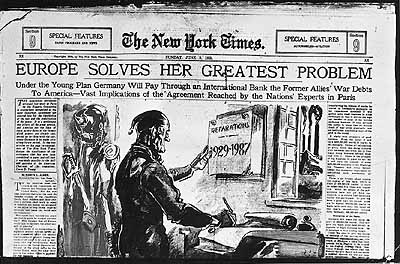The Myth of Isolationism
American Economic Engagement

Dawes Plan
- By 1924 the issue of German Reparation payments was threatening to undermine and tear apart the Versailles Peace Treaty
- Charles Dawes (appointed by Commerce Secretary Herbert Hoover) leads negotiations to help resolve the international crisis
- Under what became the Dawes Plan, Allied troops pull out of the Ruhr Industrial region in Germany, giving Germany control over a vital economic center.
- The Allies also agree to a staggered payment plan, much like credit card payments today
- Finally, US agrees to lend Germany 800 Million Dollars to help rebuild its economy so that it can pay the reparations
Young Plan
- Within a few short years the Dawes Plan starts to fall apart, US Industrialist (and president of the Radio Corporation of America) Owen Young helps negotiate a new plan (Along with US banker J.P. Morgan)
- Under the Young Plan the Allies cut Germany payments by an additional 20%
- Young Plan also establishes the Bank of International Settlements to handle the reparations payments
- Plan falls apart with the onset of the Great Depression
Together these two plans were simply an extension of US efforts to use International Law to help settle and mediate foreign relations. These two plans were important steps in the institutionalization of international finance and helped tie financial institutions into other institutions governing international relations. They also show that far from seeking to disengage with the World, the US was actually a world leader in international relations during the 1920s. (Charles Dawes received the Nobel Peace Prize for his work in forming the Dawes Plan as it was seen as averting a major international crisis)
The Dawes and Young plans also show the strategy the US government pursued to engage with the world economically. Both Dawes and Young, while having ties to the government, where primarily private businessmen and bankers. Similarly, after the war, Secretary of Commerce Herbert Hoover would frequently recommend private American citizens as financial advisers to various foreign governments with the often unspoken promise that hiring them would help said country obtain a loan from American bankers. It frequently did. Such government-private cooperation is the epitome of the Cooperative State, covered in the reading and in the next section. Again, these kinds of interactions demonstrate that US government policy was very much one of engagement with the world on economic matters.
